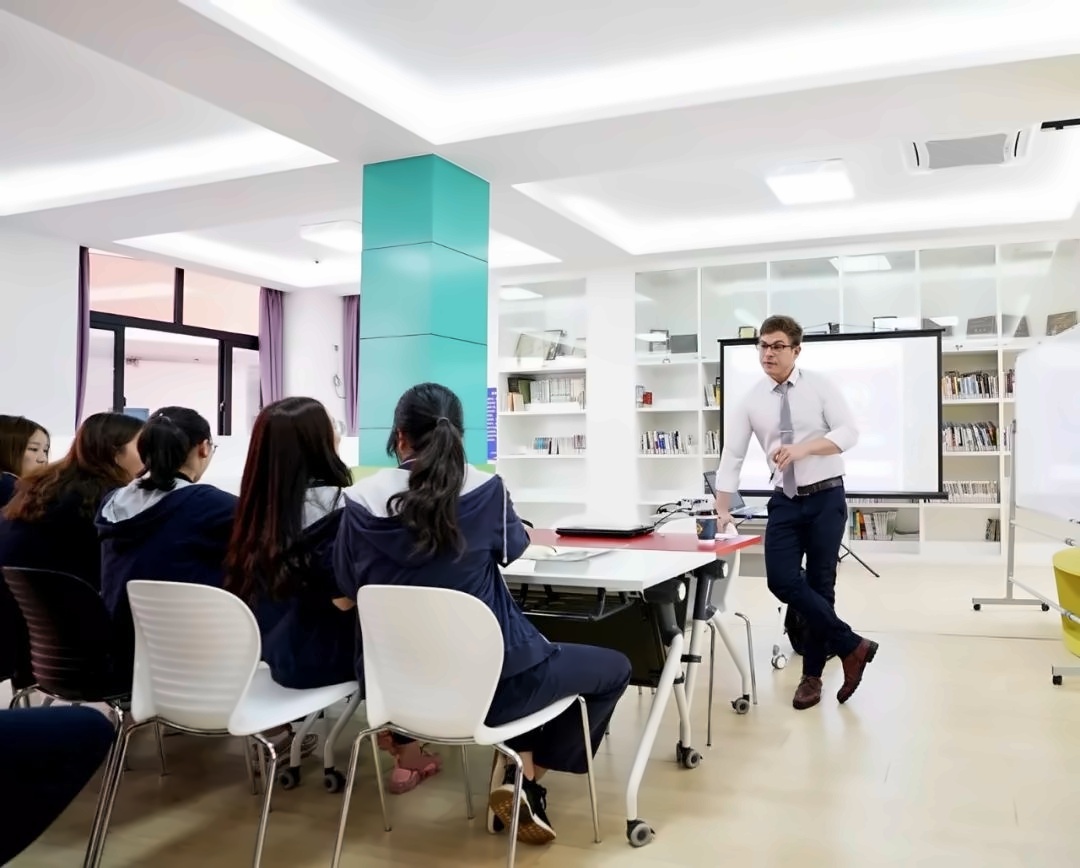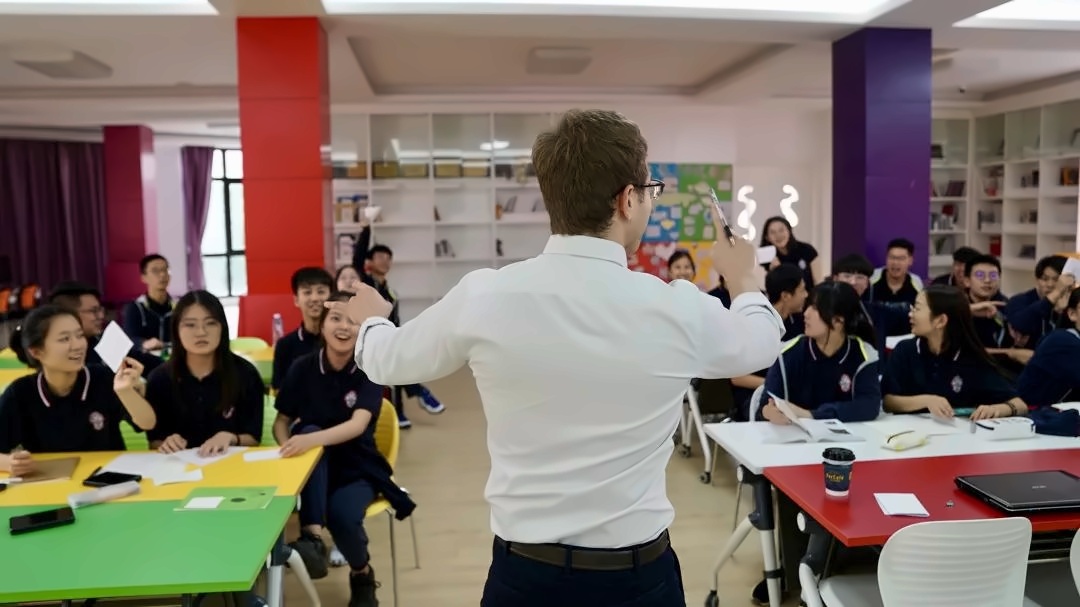全国统一学习专线 8:30-21:00
来源: 上海诺科学校 编辑:佚名
Will老师,美国诺科学校上海分校社会科学组组长,拥有七年国际学校教学经验,专注于教授AP美国历史和AP人文地理。Will老师本科毕业于美国迈阿密大学,取得历史学学士学位;硕士毕业于美国弗罗里达大西洋大学,取得历史学硕士学位。他十分热爱教育事业,擅于营造轻松活泼的课堂氛围,充分激发学生的学习热情、培养他们的发散性思维。

Will老师课堂
Q:Thank you Will for being with us for the interview. My first question for you is: What are your suggestions to students?您对学生有什么建议?
>> Thanks for having me. My suggestion to students is "Never, Never Give Up". Seriously never give up. There's a famous quote from former US President Franklin Roosevelt and he said: "When you get to the end of your rope, don't let go. You should tie a knot and hang on for as long as you can." And throughout my life, I found all times when I wanted to give up, I tied up a knot and I hanged on and things always turn out to work out for the better. So never give up and try to keep a positive attitude no matter what setback happens in your life. Always think positively and the power of thought can really do a lot in your life. You have to be an optimist. If you are a pessimist, it's just a downward spiral and it's hard to escape from that. So I think it's essential to try to be an optimist.
我对学生的建议是,永远不要放弃。美国前总统罗斯福说过:“当你想放弃时,别松手,把你的绳子打个结,继续坚持,越久越好。”我人生中想要放弃的时候,都坚持了下来,最终让我变成了更好的自己。所以,不论你身处何种逆境中,一定要积极地面对,悲观情绪是一种螺旋式下降,你很难摆脱它,因此成为一个乐观主义者很重要。
Q:How would you define a good teacher?您觉得怎样才算一个好老师?
>> A good teacher in my mind is someone who ultimately has the best interest of the students in his heart and that means not just teaching them what you are supposed to teach them, but trying to include life lessons as well as academic lessons; Someone who will support the students if they are having a difficult time in the class; Someone who won't easily fail students without understanding what other things could be causing them to do poorly. Developing the whole student, not just part of the student that's in your class. In a way, I think teachers can be like parental figures. We see many of these kids more than their parents do at these years of their life. So I think it's a duty to sort of take on that role in some way, to be the mentor as well as the classroom teacher.
我认为好老师应该心系学生的**利益。他不仅仅教授学科知识,帮助学生解决课堂上的问题,也要为学生解答人生的困惑;他不会轻易给学生打“不及格”,而是会了解学生是否有其他原因无法提高。好老师应该培养全面发展的学生,而不仅仅是课堂上的好学生。其实我们这几年见到学生的时间可能多过于他们的父母,所以从某种角度而言,我们也扮演一部分父母的形象,不仅是授课老师,更是学生的良师益友。
Q:Do you remember a lesson that you are proud of?您对自己最满意的课是哪一节?
>> You know there's a lot. But the ones that remain in my memory are the ones that I really feel students had connected with the material in some way. In a course of AP Human Geography, we had put together students to do a project. It was group work. It was collaborative and interactive. Throughout the 45-minute process of designing, discussing and presenting on the material, I can see that by the end of it, through collaboration, through discussion, through creativity, rather than just through sitting there and listening to the teacher, students could show a remarkable understanding and retention of the material. So that's one thing that stands out to me. And the topic of the lesson was to understand and to analyze the impact of a country's population structure on its social, political, economic development. That was a complicated topic, but we were able to address it and to approach the issue through different ways.
有很多课都让我觉得很满意。那些印象比较深的主要是我感觉学生与教学内容建立起某种真正的课堂。有一节AP人文地理课让我记忆尤为深刻。课上,我让学生们分组完成项目。因为是小组活动,组员间必须积极互动协作。通过45分钟的设计、讨论和演讲,同学们进行了充分的协作、探讨,并发挥了他们的创造力。我能够看到他们对于教学内容的理解和记忆有了相当的深度。这节课的主题是:理解并分析一个国家的人口结构对其社会、政治、经济发展的影响。虽然是个比较复杂的题目,但同学们都能够从不同角度提出解决方案。

Will老师讲课中
Q:What do you think about weak students?您是如何看待后进生的?
>> A weak student to me is very difficult to define, because every person is different and everyone has what I feel to be multiple intelligences. People learn in different ways, people produce best work, often in different mediums. So it's difficult to describe exactly what a weak student is. But as long as I feel a student is weak in one way, I might try to identify in what ways they are strong. Just to imagine, to think about learning styles, some students are visual learners, some students are auditory. So if a student is more of a visual learner who likes taking notes from screen, I might include some activities for them to express their artistic ability and creativity.
后进生对我而言很难定义,因为每个人都不尽相同,拥有各种各样的天赋。人们学习的方法不同,产出最优成果的途径也不同。因此,很难准确描述怎样的孩子是后进生。但只要我发现一名学生在某一方面相对薄弱时,我就会尝试发掘他的强项在哪些方面。在学习模式方面,有些学生时视觉型学习者,有些是听觉型学习者,我就会根据他们的学习特点来设计教学活动。
Q:What do you think you get most from the university experience? And what are your suggestions to our students who are going to study at US colleges?您觉得大学生活给您带来哪些收获?您对将要赴美留学的诺科学子有些什么建议?
>> What I got from it was a sense of independence, a time to really develop myself into an adult person. So we already know going to college has a sense of what it means to be out there doing things all on your own, but it's very different with no parents and following the schedule by yourself. Everything comes down to you. So what I got from the experience was a more developed work ethic, I'd say, really having to keep myself focused and it's difficult. I remember when I first went to college, I met a lot of friends the first semester and when I came back for the second semester of freshmen year, many of those people were gone already, they had failed out of school. They got caught up partying or doing something else and they didn't go to their classes and their GPA had achieved a low point and they decided to end their school there. So it takes a lot to be focused and it's easily to be distracted.
我觉得大学生活带给我一种独立感,是我真正蜕变为成年人的阶段。我们都明白,读大学意味着你需要自己处理所有的问题,但这其实很难,因为完全没有父母在旁支持,所有的事情都是独自应对,这也让我变得更更加自律。我还记得刚到大学的**学期交了很多朋友,然后第二学期返校时,他们中的许多人就已经因为学业成绩不理想而离校了,他们参加派对,不去上课,GPA也很低,大学生活只能到此**。大学里很容易就会分散精力,集中注意力学习往往要付出很多。
And my first piece of advice to our students is that it doesn't matter where you go to school at all. What matters is what you learn and how you use it. What I mean by that is you can go to Harvard for four years and study and get a 4.0 GPA, but if all you do is sitting in your room and study, you don't make friends, you don't do networking, you don't make connections, you don't go to the city and get job internships during the summer time, and if you don't take advantage of the time that you have there and the connections that are open to you, it might be a little bit wasteful. So my biggest piece of advice is to stay focused and use what you are learning, go outside and don't be afraid to get a little part-time job or internship during the semester or over the summer, make connections and do networking as best as you can. This all really improve job prospects following graduation. More advice would be to circle back to something I said at the very beginning, which is that never give up, never quit.
我对同学们的**点建议就是你去哪个大学念书并不是最重要的,最关键的是你学到了什么,并且如何运用这些知识。我想说的是,你也许可以去哈佛大学念书,拿到4.0的GPA,但假如你只是呆在房间里学习,不交朋友,不拓展自己的人脉,不去城里找实习机会,不对这段时光以及现成的人脉关系善加利用,那么就会有些浪费了。所以,我的首要建议就是集中精力,运用你的知识,走出校园,找一份兼职或实习,不要害怕,尽可能地拓展自己的交际圈,这些都能帮助你毕业后找到理想的**。第二点建议就是回到我最开始说的,不要放弃,不要退缩。
上海诺科学校报名、校园参观及了解招生动态,请: ,或通过下方报名通道登记。